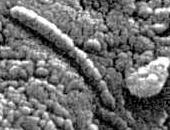Article/Document:
Why Microbes Matter
David M. Warmflash, NASA Astrobiology Institute
original source | fair use notice
Summary: Research of possible microbial life on Mars can lead to advances in biotechnology and medicine while, at the same time, bringing us closer to understanding our origins.
Research of possible microbial life on Mars can lead to advances in biotechnology and medicine while, at the same time, bringing us closer to understanding our origins.
It is difficult to speculate where this new biology may lead. We may learn to apply universal principles of biology to better understand our own type of life and to do such things as develop artificial cells, tissues and organs that might be better suited for certain purposes as compared to those that can be engineered based only on terrestrial principles.
As a potential location for our second datum of biology, our neighboring planet Mars once again beckons. The possibility that the labeled release experiment (LR), carried to Mars in 1976 aboard the two Viking landers, actually discovered microorganisms is now under serious discussion by scientists.
New instruments are being developed to search the planet, not only for fossils but also for current living organisms. Assuming that there are life forms on Mars, a thorough examination of them will tell us whether or not we have discovered an entirely different type of life.
It may turn out that on Mars we discover nothing more than another example of our own kind of life. It could be that our type of life is so tenacious that it spreads easily through space, riding inside meteorites and comets.
Perhaps then, life did not originate on our planet at all but was only seeded from elsewhere. This possibility, called panspermia, has gained some support in recent years because of studies suggesting that chunks of rock can be catapulted from one planet and deposited on another without being heated to a point that would kill any hitchhiking microorganisms.
If microorganisms have survived transfers between Earth and Mars, it could mean that the two biospheres have a common origin. If this turns out to be the case, it would not negate the possibility of eventually discovering a type of life that has originated independently of that of Earth. But it would move the search for our second datum to a more distant location, perhaps to Europa, or to other star systems.
There are intermediate possibilities too. Perhaps panspermia within the Solar System has occurred with some early type of protolife, based on RNA and a relatively crude molecular decoding system, as the transferred agent.
In such a case, different biospheres might all use the same genetic material but differ from one another in how their genetic codes evolved. This would be the equivalent of having different languages that use the same or similar alphabets.
There are many possibilities and any of them can potentially lead to advances in biotechnology and medicine while, at the same time, bringing us closer to understanding our origins.
In order to find out whether the origin of life is frequent in the universe, whether panspermia is frequent, or whether both of these phenomena occur frequently, we need to have a strong Martian exploration program.
If life is extant on Mars, we need to isolate actual organisms. If we can do this then the next step would be to determine whether or not they have DNA.
If they use something other than DNA as genetic material then we will need to find out what it is and how it works. If they do use DNA then we will need to sequence it and determine how much the organisms have in common with their terrestrial counterparts.
So, why might Martian microorganisms matter? If Mars is a living planet then its biosphere probably consists entirely of microorganisms, as ours mostly does - we and the rest of the animal kingdom, along with the plant and fungi kingdoms, are rare exceptions on Earth, which is mostly a microbial world.
If the molecular basis of Martian life differs enough from the terrestrial equivalent to constitute a second datum for life, then the microorganisms of Mars might someday become just as important to biology as are all of the species of terrestrial life put together!
David Warmflash is a member of the NASA Astrobiology Institute who works at the Johnson Space Center in Houston, TX. This article first appeared on spacedaily.com.
Read more articles on this topic:






